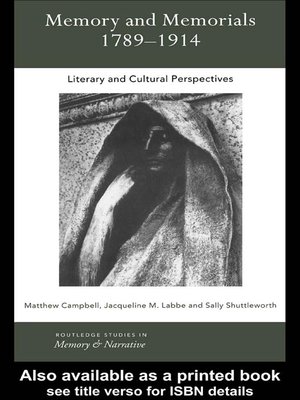Memory and Memorials, 1789-1914
ebook ∣ Literary and Cultural Perspectives · Routledge Studies in Memory and Narrative
By Matthew Campbell

Sign up to save your library
With an OverDrive account, you can save your favorite libraries for at-a-glance information about availability. Find out more about OverDrive accounts.
Find this title in Libby, the library reading app by OverDrive.



Search for a digital library with this title
Title found at these libraries:
| Library Name | Distance |
|---|---|
| Loading... |
Focusing on the 'long' nineteenth century, from the French Revolution to the beginnings of Modernism, this book examines the significance of memory in an era of furious social change. Through an examination of science, literature and history the authors explore the theme of memory as a tool of social progression, a tool that worked through the collective act of memorialising.
The book is arranged around two key sets of ideas. The first is concerned with understanding and reconstructing memory as a cultural and social phenomenon. The second part focuses on memory as a written and architectural device. Together they cover topics as diverse as:
* gender and memory
* the importance of accounts of memory in Victorian psychology for Victorian fiction
* the Memorial Hall and Nonconformist Church history
Memory and Memorials 1789-1914 employs a range of new and influential interdisciplinary methodologies. It offers both a fresh theoretical understanding of the period, and a wealth of empirical material of use to the historian, literature student or social psychologist.
The book is arranged around two key sets of ideas. The first is concerned with understanding and reconstructing memory as a cultural and social phenomenon. The second part focuses on memory as a written and architectural device. Together they cover topics as diverse as:
* gender and memory
* the importance of accounts of memory in Victorian psychology for Victorian fiction
* the Memorial Hall and Nonconformist Church history
Memory and Memorials 1789-1914 employs a range of new and influential interdisciplinary methodologies. It offers both a fresh theoretical understanding of the period, and a wealth of empirical material of use to the historian, literature student or social psychologist.







